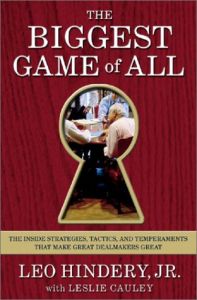Join getAbstract to access the summary!

Join getAbstract to access the summary!
Leslie Cauley and Leo Hindery, Jr.
The Biggest Game of All
The Inside Strategies, Tactics, and Temperaments that Make Great Dealmakers Great
Free Press, 2003
What's inside?
Why do big corporations make big deals, even to their economic detriment? Because they can — and here’s how.
Recommendation
This book is a must-read for anyone involved in mergers and acquisitions in the cable or media industries, a should read for people doing M&A in other industries and a worthwhile read for anyone with an interest in business and investing. The author sat at the deal-making table with some of the best negotiators in the media and communications industries. His general advice about negotiating strategy and tactics is quite familiar, but he brings a unique insight into the motivations and manipulations of CEOs and investment bankers. Academics have long puzzled over why CEOs implement value-destroying M&A deals. Here’s a first-hand, eyewitness account of how these big deals come to be. Even if you have little faith in the astuteness of executives, the author’s revelations will surprise you. Just when you thought nobody could be that stupid, here comes an anecdote about another boardroom leader who was. The detail, it must be said, gets exhaustive at times, but if you love deals, getAbstract.com thinks that you’ll be too absorbed to care.
Summary
About the Authors
Leo Hindery, Jr. is the former CEO of TeleCommunications Inc., AT&T Broadband and Global Crossing. Leslie Cauley is a staff reporter for The Wall Street Journal.

















Comment on this summary